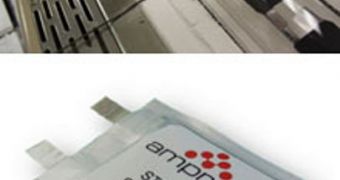A company announces that it has developed a series of batteries that can store 200 percent more electricity than anything else currently on the market. The firm has been opened for 18 months.
Engineers with the Menlo Park, California-based Amprius say that their approach to developing batteries relies on the use of nanostructured silicon electrodes.
The technology was originally pioneered by Stanford University materials science and engineering professor Yi Cui, who granted exclusive license on this technology to Amprius.
The US National Institutes of Standards and Technology has already recognized the company's performance with a $3 million grant for developing more advanced electricity-storing systems.
According to officials at the company, it would appear that the new technology will be brought to the market by early 2012. The company is already discussing collaboration opportunities with major consumer electronics manufacturers.
Experts at Amprius believe that their innovative approach will allow batteries to run up to 40 percent longer than any others, without a single recharge.
This ability, the company announces, made the new battery technology interesting for several large automakers, but officials declined to name them yet.
AT this particular point, the company is in a rush to bring its new batteries to the market, given the accelerated pace of development in the electric vehicle industry alone.
“We are in a hurry, because electrification is moving forward faster than anyone thought,” explains Kang Sun, who is the CEO of Amprius, and also the former president of Chinese company JA Solar.
He explains that any entrepreneurs seeking to gain access to this profitable market needs to move fast, adding that there are at least 80 manufacturers in China alone that produce electric vehicles.
The official goes on to say that he hopes some deals will be finalized in the next few months, which will allow him to announce some of the companies with which Amprius is currently discussing.
Experts say that the new technology will most likely be more expensive than that used for current batteries, but add that costs will be accounted for in the long run.
And Amprius is apparently dedicated to making that possible. “Making it compatible with current processes is important to us,” explains Ryan Kottenstette.
He is the company's director of business development, Technology Review reports.

 14 DAY TRIAL //
14 DAY TRIAL //